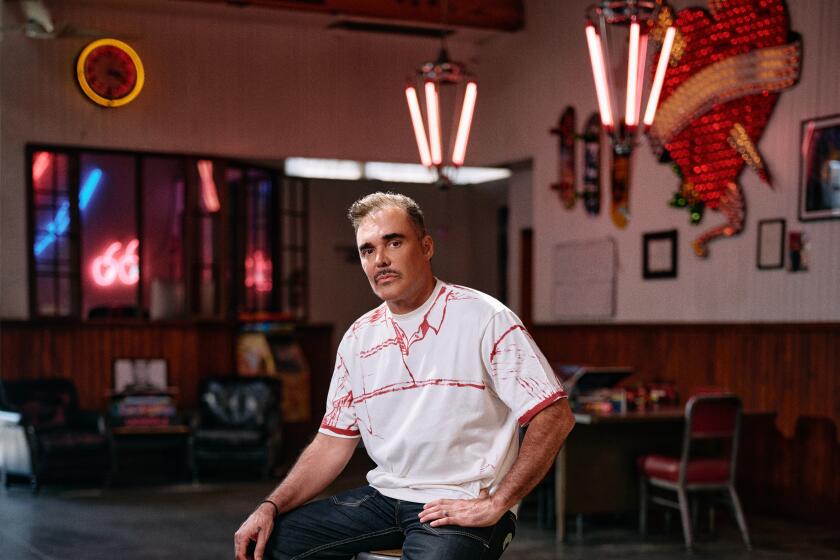Book review: ‘Triple Crossing’ by Sebastian Rotella
Certain intersections of time and geography are ideal as settings for thrillers: Think the south of France after the fall of Paris in 1940, behind the Iron Curtain during the Cold War, especially Berlin in the ‘60s, the Middle East — and for the past 20 years or so, the border between Mexico and the United States.
In the past decade a number of excellent books have explored this fertile border territory from different perspectives. Add to that list “Triple Crossing” by Sebastian Rotella, a former Los Angeles Times correspondent who knows the area well.
“Triple Crossing” is a clever title for a story about the pursuit of justice by law enforcement on both sides of the U.S and Mexican border. All the cops have personal and professional agendas that diverge and coincide and they are, to a man and woman, a celebration of the globalization of, well, everything. The geographical and emotional borders within which each lives are elastic, porous and ambiguous.
Take the protagonist from north of the border: Valentine Pescatore, a Border Patrol agent who walks the Line between San Diego and Tijuana. He is from Chicago, the son of a woman of Mexican descent who does not speak Spanish. His father is an Argentine of Italian descent, who does. After Pescatore arrives in San Diego, he finds what passes for the town’s Little Italy to sooth his homesickness and endures derogatory comments on his accents in English and Spanish. Like most reluctant heroes who are drawn into intrigue, Pescatore makes a mistake that leaves him vulnerable to coercion. To keep his job — and avoid prosecution — he must go undercover to root out corrupt Border Patrol agents. His handler is Isabel Puente, a Cuban American from the Inspector General’s office. That he ends up infiltrating the Mexican drug cartel that is the focus of a cross-border investigation is because of a combination of smarts, coincidence and plain dumb luck.
South of the border is Leobardo Mendez, a journalist who becomes a state human-rights commissioner, which leads in turn to becoming the head of a special police unit, the Diogenes Group, that is tasked with policing Mexico’s police. As a cop who polices the cops, Mendez is reviled among his fellow officers in Mexico. His closest ally is Puente. But although they speak the same language and share the same profession, left-leaning former journalists from Mexico don’t always see eye to eye with Miami’s Cuban émigrés.
The three of them come together and bounce apart in their pursuit of Junior Ruiz Caballero, the leader of a cartel who is an out-and-out psychopath. Caballero’s business interests have expanded far beyond smuggling people — not just Mexican nationals but OTMs (other than Mexicans) — and dope north from Mexico and receiving guns and cash flowing south from the U.S. all the way to the lawless intersection of Brazil, Paraguay and Argentina. And it’s there, at the Triple Border, that Rotella’s story opens a window into the true globalization of the business of crime.
In this nexus, ill-gotten cash meets a wide-range of nefarious investment opportunities ranging from pirated intellectual property to jihadists looking for funding. The region is run by a group of able practitioners of moral relativism from the Americas, Asia, Europe and the Middle East whose alliances are forever shifting. Everything is for sale, and the intersection of business and politics in a lawless environment makes for interesting bedfellows: There’s Facundo, the Argentine Jew — consulting for American interests — who takes a suitcase of cash from the U.S. delivered by Puente to help buy better law enforcement. Facundo, in turn, exchanges some of the cash, as well as racial insults, with Munir, an Arab who runs the Ciudad del Este, Paraguay’s chamber of commerce, when he isn’t hosting young men in kaffiyehs who are raising money for training camps in Pakistan. And then there’s Mr. Han from the Taiwanese consulate, who exchanges what he knows about Junior’s business in the region for information on Chinese being smuggled from Mexico to the U.S. When it comes to trading, Wall Street has nothing on these guys.
All of Rotella’s characters are goal-oriented and not afraid to cross lines to attain them. Loyalties are questioned, bartered and compromised. Even good guys such as Mendez are not above horse trading, in the U.S. with the media no less, to get the resolution they are seeking.
Ambiguity can breed frustration, but not here. In spite of — or perhaps because of — it, the story ends just as it should. Maybe not as you might predict, but when it comes to “Triple Crossing,” it’s best to expect the unexpected.
More to Read
Sign up for our Book Club newsletter
Get the latest news, events and more from the Los Angeles Times Book Club, and help us get L.A. reading and talking.
You may occasionally receive promotional content from the Los Angeles Times.








